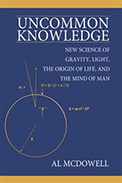
 |
Uncommon Knowledge: New Science of Gravity, Light, The Origin of Life , And The Mind of Man
by Al McDowell
AuthorHouse
Anyone who has recently studied Darwin, read about Einstein's theories of relativity, or Newton's gravity and ether, will enjoy the latest thinking regarding errors in the works of these giants of science. But one need only listen to TV shows on wormholes, early mankind, or ancient aliens to take interest in discussions advanced by the author. Uncommon Knowledge holds something for everyone to muse upon or voice an opinion about. McDowell explains current reasoning based on research that contradicts earlier views and points to discovery. He proposes that modern observations discredit the Big Bang theory and call into question Einstein's constant light speed. McDowell urges return to Newton's ether concept, advancing evidence that ether is filled with spherical particles that produce the effect we call gravity and affect the speeds of light and electromagnetic waves. The author discredits evolution and suggests solar events and space travelers brought life and advances to Earth.
Students will appreciate McDowell's thoroughness and scientific background, as well as convenient access to such a breadth of information. Well-thought-out discussions still require definitive proof before there can be consensus. Casual readers may question phrases like "presently only fictional, conceivable, plausible, a and according to legend." Those with orthodox opinions on the origin of life and the mind of man will disagree with the author's conclusions. In Paradise Lost, Milton depicts Adam busy questioning an angel about these same deep subjects while Eve wanders away, encountering the serpent. That parable suggests Knowledge is for the ages, while Wisdom suits the moment. McDowell provides an admirable index and listing of nearly 250 reference sources, along with many diagrams and cross references within the text about studies performed. Since end notes were not provided, it becomes uncertain which original content McDowell contributed in this exhaustive 364 pages of textual argument.